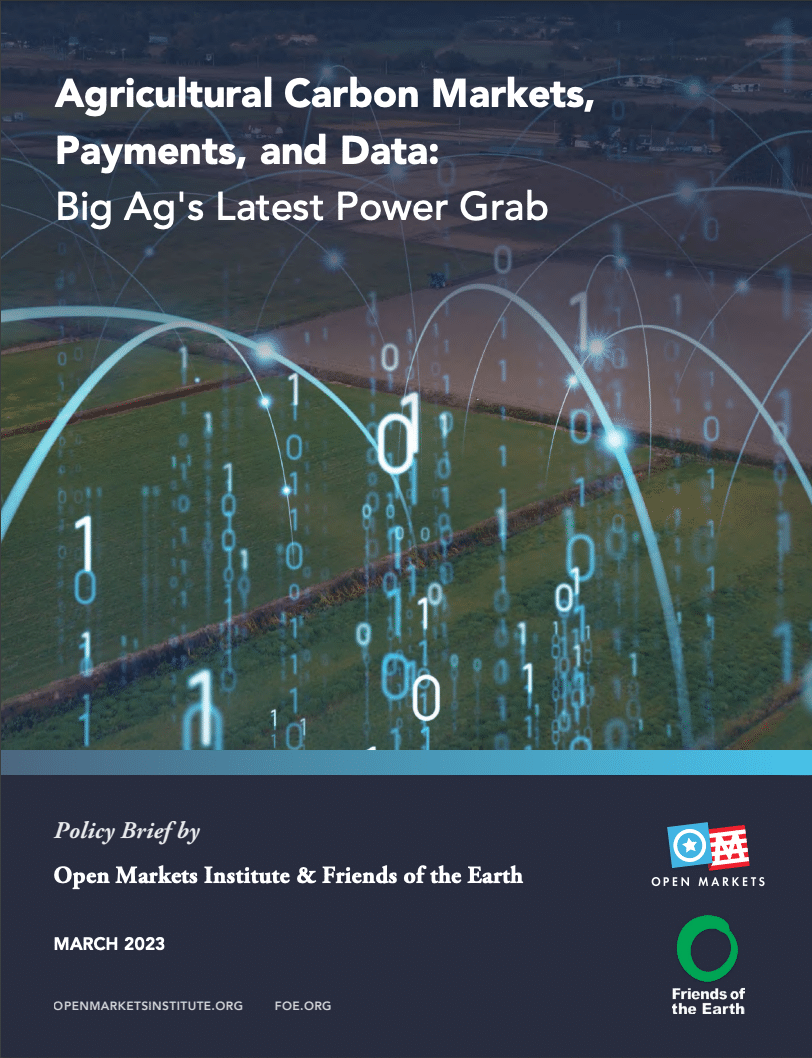Agricultural Carbon Markets, Payments, and Data: Big Ag’s Latest Power Grab

On the heels of new federal climate and agriculture policies geared toward supporting agricultural carbon markets, a report from Friends of the Earth and Open Markets Institute reveals how this approach will fail to address the climate crisis while enabling the largest agribusiness corporations to entrench their market power and greenwash their operations.
The report breaks down the pitfalls of private programs that pay farmers to generate carbon offsets for corporate buyers. Polluters can buy credits from projects that overestimate their carbon sequestration or fail to store carbon long-term, running the risk of increasing emissions while worsening pollution hot-spots in low-wealth and Black and Brown communities.
Read the Executive Summary
Read the Full Report
Read the Press Release
Introduction
Agriculture, Climate Change, and Soil Carbon
What Are “Carbon Markets” And Do They Work?
How Voluntary Carbon Payment Programs Entrench Big Ag
Conclusion and Recommendations
There is no scientific consensus on how long carbon remains in the soil. It can be released by changing land management practices or severe weather events. Selling and buying soil-based offsets is little more than speculation.
Current sequestration verification programs allow major corporations like Bayer and Corteva to collect and monetize farm data by driving farmers to their digital platforms. These platforms further incentivize and promote their seed and pesticide products like RoundUp, entrenching corporate power and chemical-intensive monocultures.
These programs are often not designed for smaller and ecologically regenerative farms. Generally, the largest farms have the most to gain from carbon payments, threatening to further consolidation in farm land. In order to participate, farmers must contractually commit to years or even decades of more expensive practices to produce credits for Big Ag with minimal guarantees of return on investment.
Congress and USDA should invest in real solutions by increasing funding and improving existing conservation programs rather than relying on harmful offset schemes.
Related Resources
- Bayer-Monsanto Merger: Big Data, Big Agriculture, Big Problems
- Carbon Markets and Offsets: Unjust, Ineffective Distractions from Real Solutions
- 222 Organizations Reject “Growing Climate Solutions Act”
- Soil Health and Pesticides Study
- Congress Encourages Corporate Sponsorship of USDA Conservation Programs
- Following $10 Billion Roundup Settlement, Bayer Uses Climate Program as Front to Lock in Control of Farmer Data and Sell More Roundup
Ways to Support Our Work

Read Latest News
Stay informed and inspired. Read our latest press releases to see how we’re making a difference for the planet.

See Our Impact
See the real wins your support made possible. Read about the campaign wins we’ve fought for and won together.

Donate Today
Help power change. It takes support from environmental champions like you to build a more healthy and just world.